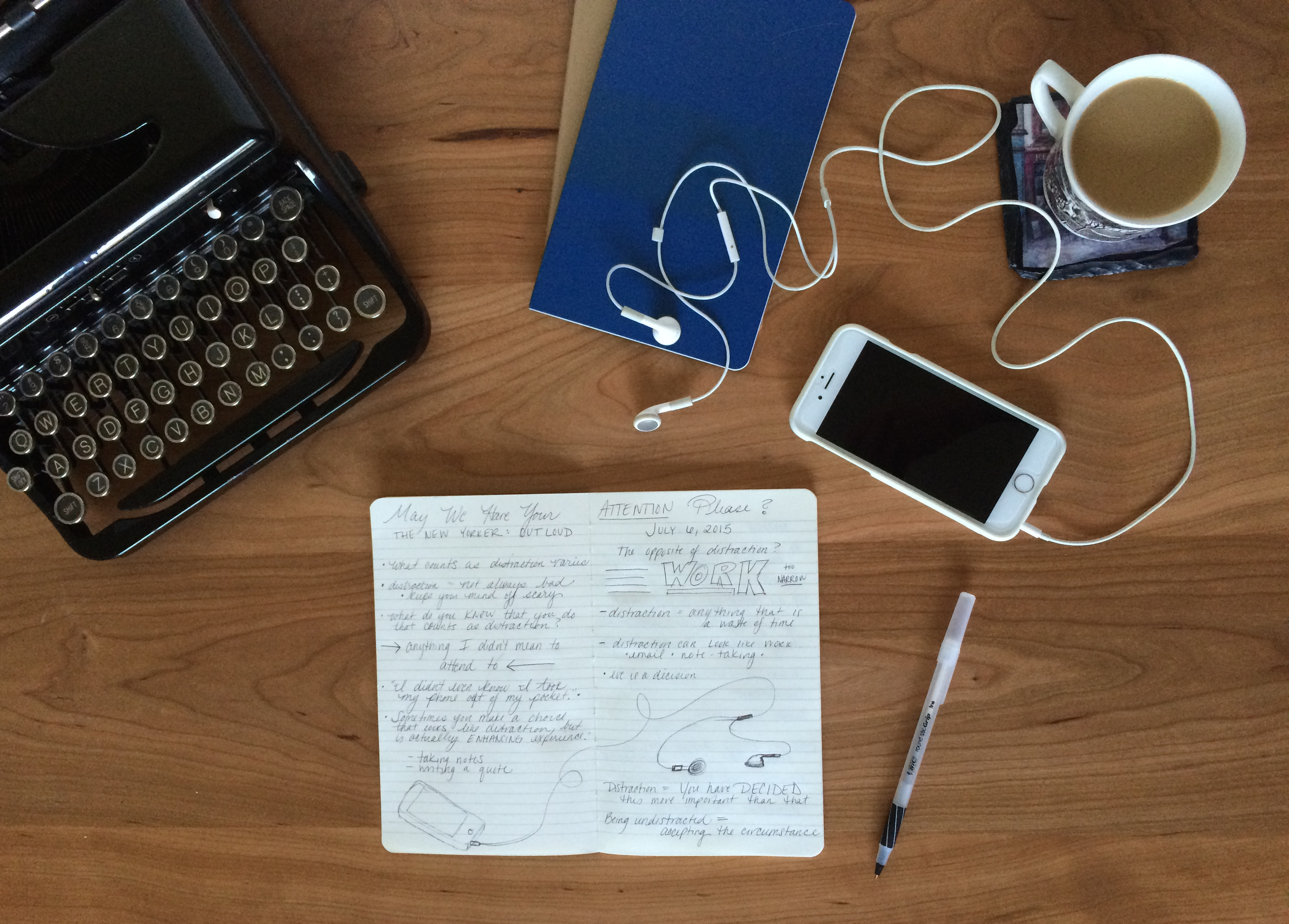
I have an off again, on again relationship with podcasts. I want to be as in love with them as everyone else, I really do. But I dislike listening to audio things other than music. I’m still not a fan of audio books. I do not listening to news videos if there is a transcript available to read instead. I read faster than I listen, which sounds silly, but it’s true.
So when Callie came to me with the idea of listening to and writing about a podcast once a month together, I said “Yes! This is the thing that will make me fall in love with podcasts, finally.”
So far? So good. Although the first one was pretty short (less than 20 minutes), so we’ll see as things go on; if they get longer and I find it harder to pay attention.
And the first podcast, our choice for July? About distraction. Of course it is.
Without further ado…

New Yorker “Out Loud” Podcast, July 6th 2015 – May We Have Your Attention, Please?
Joshua Rothman and Andrew Marantz discuss theories of distraction and the benefits and drawbacks of concentration.
Well, then. This episode is about distraction: is it good? bad? What is it, exactly?
The first definition was “anything I didn’t mean to attend to.” But this leaves no room for daydreams, when your mind wanders aimlessly and stumbles upon a brilliant (or not so brilliant) idea, for when you really need to just tune out the world and think inward.
So Definition One was a bit of a bust. Maybe the opposite of distraction is WORK? Distraction is anything that is a waste of time. But what if it looks like work? For me, this is often the case. Email, cleaning, note-taking, researching… they all “look” like work, but really they are often distracting me from my real work: writing.
Everything is a Decision
One commentator mentioned that everything we do is a decision: and I agree. If we allow ourselves to be distracted, it is because we have decided that Thing 2 is more important to us than Thing 1, our priority, at least in that moment.
For me, as a writer, this is a tough pill to swallow. If I’m bemoaning my inability to make progress on my novel, is it my own fault? And not the fault of all the extraneous circumstances that I tend to blame it on? Work, lack of sleep, events outside of my control… you know the drill.
Then, too, it is harder to create than to consume. Creativity takes more energy, needs more space to breathe before it becomes fruitful. My decision to work full time a distraction? It is of course hindering my novel progress – but is that really a decision that most of us get to make? Or do I have to settle into the realization that writing is always going to take up the odd hours of life, and I need to find a way to make a few more of those odd hours happen?

Being Un-Distracted = Accepting the Circumstances
When we are not distracted – when we are paying attention and being fully present – it is because we have accepted the circumstances we are in. I know a lot of mothers discuss this part of raising a family: the constant reminder to be present when with your children, rather than constantly distracted from the most important with what seems like the most important – laundry, dishes, supper.
For me? I made two promises to myself this year: to blog every Tuesday and Thursday and to finish my novel. The novel often gets set aside because of the deadlines of the blog… and since I’m not willing to break my first promise to myself, I am going to have to accept the circumstances that blogging brings: I will not finish my novel as quickly.
And I need to be okay with that.
The Ability to Focus is a Muscle
What distraction seems to boil down to is whether or not we can control what we are distracted by. In the podcast, one of the commentators says:
We are called upon to be more attentive these days… When we have to concentrate and shape our own stories, distraction is more threatening.
As we write our own narratives in our life, distraction plays a role in keeping us from writing the best narratives. I’m not advocating that there is no room for downtime, that nobody needs a Monday evening of nothing once in a while. But we ought to be mindful of what is keeping us from our greater goals: is it games on our iPhone that mean nothing in real life? Is it shopping on a Saturday instead of reading something enlightening?
The decision is ours. No one else can make it for us. And everyone needs to pay attention to different things.
I think this is what makes life hard: the constant deciding, the constant second-guessing. I think that’s maybe why the podcast ended by asking if distraction is really a problem of self-acceptance. If our distractions are abhorrent to us, is it us merely us wishing we were different? And should we?
What is your definition of distraction? Is it one of these here?
Make sure to click over and read Callie’s post about this same podcast – she’s got some excellent thoughts about being too productive, the book Walk Two Moons, and how we rarely know what we are going to write about when we actually sit down to write.
Next month? The Longform Podcast – #148: Anna Holmes.

Leave a Reply